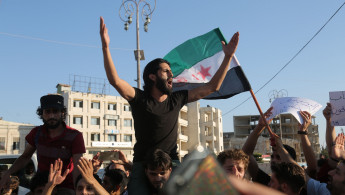Hundreds protest against HTS-affiliated ‘government’ in Syrian city of Idlib
Hundreds of people took to the streets of the city of Idlib in northwestern Syria on Saturday evening to protest against the self-proclaimed National Salvation Government, which is affiliated to the hardline Islamist group Hay’at Tahrir al-Sham (HTS).
The protests took place after Russian airstrikes killed at least six people in southern Idlib province earlier on Saturday.
Read more: Syrians flee Idlib for miserable displacement camps
The protesters condemned what they called the repressive measures that the National Salvation Government had imposed on Idlib province, which is home to 3 million people, nearly half of whom have been displaced from other parts of Syria.
The National Salvation Government has recently raised the prices of fuel, as winter sets in and imposed a tax on olive oil, one of Idlib’s main products.
Protesters raised the Syrian revolutionary flag, which HTS refuses to be associated with, and called on HTS fighters to leave cities in Idlib province and stop interfering in civilian affairs.
Twitter Post
|
Protests against the National Salvation Government have taken place before, but HTS’s armed presence in cities has meant that they have decreased in number. Since January last year, HTS has dominated rebel-held Idlib province and imposed taxes and levies on the civilian population, as well as repressing civil and political activity outside its control.
HTS’s security forces have also detained Syrian political and media activists on a regular basis, forcing many into exile.
The Syrian conflict broke out in 2011, after thousands of pro-democracy protesters were killed by the Assad regime. Over 500,000 civilians have been killed and millions more displaced internally or externally, mostly as a result of regime bombardment of civilian areas.
Follow us on Twitter: @The_NewArab





 Follow the Middle East's top stories in English at The New Arab on Google News
Follow the Middle East's top stories in English at The New Arab on Google News


![22 Arab countries at COP29 have rejected the targeting of fossil fuels [Getty]](/sites/default/files/styles/image_330x185/public/2024-11/GettyImages-2184289638.jpg?h=199d8c1f&itok=ptHl5bec)